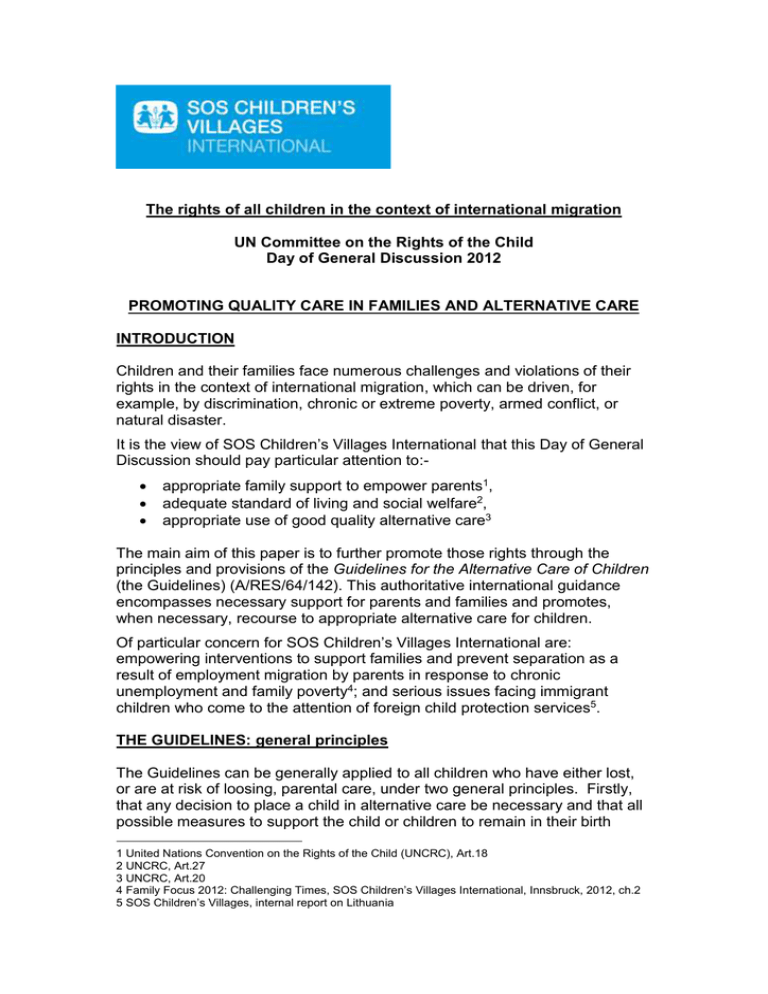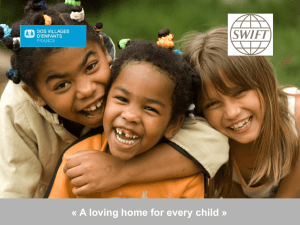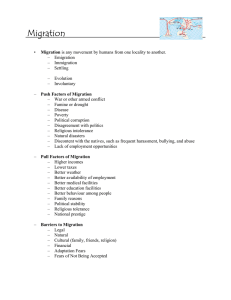The rights of all children in the context of international... UN Committee on the Rights of the Child
advertisement

The rights of all children in the context of international migration UN Committee on the Rights of the Child Day of General Discussion 2012 PROMOTING QUALITY CARE IN FAMILIES AND ALTERNATIVE CARE INTRODUCTION Children and their families face numerous challenges and violations of their rights in the context of international migration, which can be driven, for example, by discrimination, chronic or extreme poverty, armed conflict, or natural disaster. It is the view of SOS Children’s Villages International that this Day of General Discussion should pay particular attention to: appropriate family support to empower parents1, adequate standard of living and social welfare2, appropriate use of good quality alternative care3 The main aim of this paper is to further promote those rights through the principles and provisions of the Guidelines for the Alternative Care of Children (the Guidelines) (A/RES/64/142). This authoritative international guidance encompasses necessary support for parents and families and promotes, when necessary, recourse to appropriate alternative care for children. Of particular concern for SOS Children’s Villages International are: empowering interventions to support families and prevent separation as a result of employment migration by parents in response to chronic unemployment and family poverty4; and serious issues facing immigrant children who come to the attention of foreign child protection services5. THE GUIDELINES: general principles The Guidelines can be generally applied to all children who have either lost, or are at risk of loosing, parental care, under two general principles. Firstly, that any decision to place a child in alternative care be necessary and that all possible measures to support the child or children to remain in their birth 1 United Nations Convention on the Rights of the Child (UNCRC), Art.18 2 UNCRC, Art.27 3 UNCRC, Art.20 4 Family Focus 2012: Challenging Times, SOS Children’s Villages International, Innsbruck, 2012, ch.2 5 SOS Children’s Villages, internal report on Lithuania family have been fully considered in determining that necessity. Secondly, that having determined necessity, any measures to provide alternative care in any suitable care setting, be appropriate to the individual care, protection and developmental needs of the children concerned. Across both of these dimensions decision-making processes and outcomes should be firmly grounded by informed participation of children and families and guided by a determination of the best interests of the child, or children, on a strictly case-by-case basis. THE GUIDELINES: promoting, preserving and reintegrating families In the context of international migration this leads to considerations as to why parents, often driven by a desire to better the lives of their family, travel abroad for work. It also raises specific concerns around issues of long-term separation caused by employment migration and the denial of the right to family reintegration6. It further raises concerns about permanent separation when the parent abroad is unable to return or breaks off contact. The Guidelines offer specific guidance on preserving and reintegrating families affected by separation resulting from any form of vulnerability. Under the heading of promoting parental care is an empowering agenda requiring “consistent and reinforcing family-oriented policy…to promote and strengthen parents’ ability to care”7 and to ensure that all families have the “attitudes, skills, capacities and tools to enable them”8 in protecting and caring for children. As such a range of potential supportive interventions are outlined including training and capacity-building, social assistance, opportunities for employment and other income generating activities, and other services 9. It is such strengthening and support for families that, in terms of the Guidelines, should firstly serve to prevent the need for a decision to place a child in care10 but that also should serve to promote family reintegration11 for children in care. Whilst these paragraphs refer specifically to children potentially in need of alternative care the general principles and provisions are also relevant and applicable in the context of family separation as a result of employment migration12 and for children in need of support or care outside their country of habitual residence.13 EMPLOYMENT MIGRATION: and Family Separation It is of particular relevance in the current context of a global economic crisis and rising unemployment to discuss the impact this can have on vulnerable parents, families and children. According to the International Labour Office 6 UNCRC, Art.25 7 Guidelines for the Alternative Care of Children (A/RES/64/142) - (the Guidelines), para.33 8 the Guidelines, para.34 9 the Guidelines, paras.34a, 34b 10 the Guidelines, paras.39-48 11 the Guidelines, paras.49-52 12 the Guidelines, para.9a 13 the Guidelines, paras.137-152 global unemployment levels rose from 180 to 205 million between 2007 and 2009 and, in many national contexts, it has been noted that long-term unemployment has also increased.14 In short, more people are unemployed and also find themselves unemployed for longer. One response to this problem is for a parent or parents to migrate in search of better opportunities and earnings to support the family. Such migration may therefore lead to number of life circumstances for children. For example, living in a single parent family, in a sibling-headed household, or placed in the care/guardianship of friends or other relatives, for example grandparents. However, employment migration can also lead to abandonment and consequently increasing numbers of placements in alternative care.15 In any case the question remains as to what could, or should have been done, within the context of the right to appropriate support to prevent such separation. Whilst the decision to migrate for employment may be aspirational, seeking better work, better wages, more opportunities, and to supporting the family, the reality is often very different. Despite the promise of equal pay for equal work the reality is that many migrant workers find themselves in unregulated work, with no social protections or benefits, low wages, hazardous and/exploitative working conditions with no legal protection.16 In such circumstances the outcome can be that the parent simply looses touch with the family and children with consequently significant impact on the emotional well-being of the children.17 Furthermore, undocumented migrants are often denied access to supportive and protective services for their children in the host country. Additionally, temporary migrants may be excluded from accessing social security schemes in high-income countries. It is vital that the rights of children are upheld through efforts to support and strengthen families and parents in fulfilling their common responsibilities. SOS Children’s Villages believes that work to prevent employment migration is central to protecting the rights of children in their families. Employment is vital to family survival and adequate income is vital to ensuring an adequate standard of living thus serving to empower parents.18 It is of further concern that increasing numbers of women migrate for work, often migrating autonomously as opposed to following their husbands or partners, who may then leave behind children in the extended family or even in alternative care. Whilst noting the vital importance of addressing questions regarding equitable access to the labour market for women it is also important that appropriate interventions to address the psychological and emotional impact on children of the absence of either parent, or potentially both parents, must also be highlighted in the debate. 14 cited in The Global Social Crisis, United Nations (ed.), 2011. 15 SOS Children’s Villages, internal report on Lithuania 16 Family Focus 2012: Challenging Times, SOS Children’s Villages International, Innsbruck, 2012, p44 17 Family Focus 2012: Challenging Times, SOS Children’s Villages International, Innsbruck, 2012, p48 18 Family Focus 2012: Challenging Times, SOS Children’s Villages International, Innsbruck, 2012, p52 In all cases working to support and strengthen vulnerable families and prevent such migration must be founded on ensuring tailored responses that address the specific problems in families and communities. Such an approach is central to the provisions and principles requiring case-by-case responses presented in the Guidelines. In the programmatic of SOS Children’s Villages this work includes supportive initiatives, for example, Vocational, practical and social skills training to promote employability Income generating activities Small family businesses Small interest-free loans and micro-credit Legal counselling For example, in Colombia this work has focussed on empowering women through the provision of quality, safe day-care that has allowed women the time and space to attend trainings and/or get out to work. Training has include, for example, adult literacy, job-seeking skills, and small business development (further supported by micro-credit). After 2 years of work the rates of women in work in the programme had risen from 15% to 82%. 19 No family should be placed in the position where they are forced to choose between employment and family separation and dedicated effort is required to create jobs and opportunities to empower parents. States party to the convention must give all due consideration to efforts to prevent and respond to employment migration and the consequent separation of parents and children that has significant negative impacts on child well-being and development. These efforts may include, but should not be limited to: Local job creation with adequate conditions and pay. Appropriate and adequate social security for the unemployed. Vocational skills and other relevant training opportunities. Support for self-employment, small business and micro-credit schemes. Challenging the exclusion of migrant workers and their children from necessary social support. Co/operate with other states to support family visits and reunification. Ensure emotional support and quality care for affected children CHILDREN and CARE: outside their country of habitual residence The questions under this issue extend to both children who have migrated for the purposes of being cared for and those already abroad who, for whatever reason, find themselves subject to child protection systems in the host country. 19 Family Focus 2012: Challenging Times, SOS Children’s Villages International, Innsbruck, 2012, p53 In situations where children have migrated in order to receive care, for example, for temporary medical treatment, temporary hosting or respite care, the provisions of the Guidelines should be applied to all responsible public or private entities and persons20 with oversight from a designated body to ensure quality of care.21 Where international adoption is the motivation for migration the Guidelines reiterate the need for States to ratify or accede to the Hague Convention of 19 October 1996.22 In cases where children are already abroad the Guidelines emphasise that children outside their country of habitual residence are entitled to benefit from the same levels of care and protection as nationals of the host country. 23 In particular it is noted that unaccompanied, separated, and trafficked children should not, in principle, be deprived of their liberty24 or held in police detention25 but that appropriate alternative care provision be made on a caseby-case basis.26 States are reminded in the Guidelines of the need to make proper arrangements for the planned and supported return and reunification of children when this is in their best interests.27 This is foreseen to require cooperation across all levels of governance and between States through consular services or other relevant channels of international cooperation. At a minimum returns should only be conducted following: Family tracing with a view to planned and supported reunification. A risk assessment regarding return to ensure safety and security. The identification of a responsible and appropriate carer in the country of origin. A determination of the best interests of the child prior to any return.28 Children migrating for care, or for other reasons, may present with numerous issues related to their care, protection and developmental needs. A basic requirement of State responses to these situations is individualised responses founded on an assessment of the best interests of the child. Some measures may include but should not be limited to; The training of customs and immigration officials on child rights and the promotion of child-friendly practice. Ensuring systematic inter-agency referrals, for example between immigration, social work and the police. Appointing a responsible adult or agency to accompany and support the child through decision-making processes. Guaranteeing the risk assessment, best interests determination, and support for a planned, supported and monitored return to a safe, 20 The Guidelines, para.137 21 The Guidelines, para.138 22 The Guidelines, para.136 23 The Guidelines, para.141 24 The Guidelines, para.143 25 The Guidelines, para.144 26 The Guidelines, para.142 27 The Guidelines, paras.146-152 28 The Guidelines, para. 148 secure and stable environment – i.e. reunification with a responsible and appropriate carer. Ensuring that all efforts to trace family for possible reunification are exhausted before any decisions are made with respect to more permanent care solutions such as adoption or kafala of Islamic law. Key Questions/Concerns for this DGD With specific relevance for UNCRC Articles, inter alia 18, 20, & 27 and the guiding principles and provisions in the Guidelines for the Alternative Care of Children: What measures are required to guarantee employment opportunities that provide adequate standard of living and prevent unnecessary family separation due to employment migration – particularly when the decision to migrate is motivated by factors such as chronic poverty? When employment migration leaves children in the informal care of siblings, grandparents, aunts, uncles, family friend’s or close relatives what measures are required to ensure appropriate support for the care of the children? When employment migration results in child abandonment or other child protection concerns does the formal alternative care system provide a range of suitable quality care options to respond on a caseby-case basis and guarantee care in the best interests of the children concerned? What measures are required, in collaboration between States Party to ensure that the children of migrant workers rights to family reintegration are fully respected without prejudice or discrimination? If a parent working abroad, irrespective of their migration status, seeks a return what support and strengthening measures are required to facilitate that return and to ensure the sustainability of family reintegration? In circumstances where children have travelled abroad, with or without parents and have, for whatever reason, become subject to child protection systems in a host country does the State: o comply with child rights standards guaranteeing care, protection, and child development without discrimination? o fulfil these obligations based on the child’s presence in the jurisdiction – including international co-operation to assess the possibility of a planned, supported and monitored return to the country of origin?

